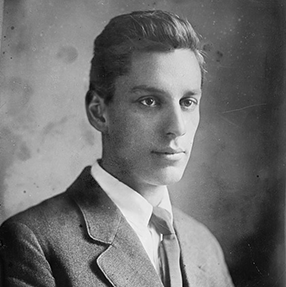X Rays
Your eyes were gem-like in that dim deep chamber
Hushed and sombre with imprisoned fire,
With yellow ghostly globes of intense aether
Potent as the rays of pure desire.
Your voice was startled into vivid wonder,
When the winged wild whining mystic wheel
Took flight and shot the dark with frosty crashings
Like an ice-berg splitting to the keel.
Your flesh was never warmer to my passion
Than when, moving in that lumor green,
We saw with eyes our fragile bones enamoured
Clasping sadly on the pallid screen.
You seemed so virginal and so undreaming
Of the burning hunger in my eyes,
To peer more fever-deeply in your being
Than the very death of passion lies.
The subtle-tuned shy motions of your spirit,
Fashioned through the ages for the sun,
Were dumb in that green lustre-haunted cavern
Where you walked a naked skeleton;
Slim-hipped and fluent and of lovely motion,
Living to the tip of every bone,
And ah, too exquisitely vivid-moving
Ever to lie wanly down alone—
To lie forever down so still and slender,
Tracing on the ancient screen of night
That naked and pale writing of the wonder
Of your beauty breathing in the light.
This poem is in the public domain. Published in Poem-a-Day on January 29, 2022, by the Academy of American Poets.
Max Eastman’s poem “X Rays” appeared in vol. 1, no. 8 of The Liberator (October 1918), a socialist magazine edited by Eastman himself. In the same month, the poem was also published as a part of his collection Colors of Life (A. A. Knopf, 1918). In Max Eastman: A Life (Yale University Press, 2017), Christoph Irmscher, distinguished professor of English at Indiana University Bloomington, discussing Eastman’s poetry on the subject of his relationship with silent film actress Florence Deshon, writes that “[a]rguably the most successful poem in the collection is ‘X Rays,’ where Max, for once, finds an objective correlative for the overflow of emotion that makes some of the other poems almost a little embarrassing to read. The occasion for ‘X Rays’ is unknown. Did Florence have an X-ray taken with Max present? Did Max merely imagine the scene? No matter, the metaphor finally allows Max to separate the lover from the poet, and with great success. Countering fears about the invasiveness of X-rays, the machine makes Florence seem more naked than just naked: a virginal, vivid skeleton in the green light, startled into an intense purity, stripped of the flesh Max so desires, a ‘naked and pale . . . wonder,’ a slim-hipped, exquisitely boned spectacle, luminous, fragile, and self-sufficient against the dark screen of Max’s life.”

